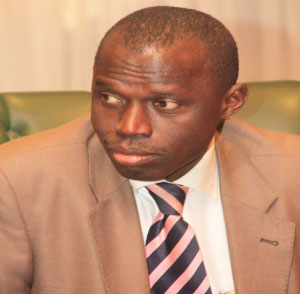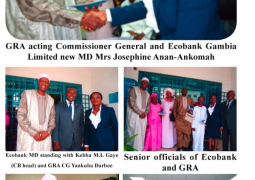
The
Gambia government is to undergo reforms in 2017 to restore economic stability
by making sure government expenditure is not erratic and is as budgeted, to
ensure that the perennial financial indiscipline is halted.
The
Ministry of Finance and Economic Affairs is to undertake the reforms by taking
measures such as restricting the national budget, reducing the stock of
national public debt, and reform the state-owned enterprises.
“While
some of the reforms may be tough, they are nonetheless needed if we are to
restore macroeconomic stability,” the Finance and Economic Affairs Minister
said yesterday at the National Assembly in Banjul, as he presented the
estimates of the Gambia government budget for 2017.
Abdou
Kolley said while the challenges leading to the reforms are significant, “they
are not insurmountable, with adequate communication, coordination and most
importantly, commitment”.
Budget
for 2017
The
finance minister said the total revenue and grants in 2017 is estimated at
D14.34 billion from 12.99 billion budgeted in 2016, representing a growth of
10.4 per cent.
On
the other hand, total expenditure and net lending is projected at 19.1 billion
in 2017, from D16.9 billion budgeted in 2016, representing an increase of 13.0
per cent.
The
minister said the bulk of the projected expenditure is directed at current
spending.
Due
to the mismatch between the protected total income and expenditure, the fiscal
deficit for 2017 is anticipated to increase to D4.7 billion from 3.9 billion
budgeted in 2016.
This
represents a growth of deficit of 20.5 per cent and is equivalent to 10 per
cent of the national Gross Domestic Product (GDP).
“Due
to increasing fiscal imbalances, government must adhere strictly to budget
ceilings to register gains associated with fiscal consolidation and increase
efforts towards more resource mobilization,” Minister Kolley said.
He
explained that based on the composition of the 2017 national budget, greater
priority would be given to capital expenditure in preparing monthly cash
allocations. This would be combined with
efforts to gradually reduce the share of recurrent spending in favour of
capital spending.
“This
will create more infrastructural development initiatives that will create jobs
for the citizenry and enhance the investment environment of the country, thus
placing the Gambia back on the list of business friendly nations,” he said.
Tax
adjustments
Starting
January 2017, the government will introduce D1 per litre fuel levy in the fuel
pump price to replace the annual payment of vehicle license and road tax.
According
to the finance minister, this is prompted by the fact that transport owners
delay or avoid paying their vehicle licenses and road tax on time. Besides, the government not only spends huge
sums printing license and road tax discs, but also loses significant amounts of
money due to the counterfeiting of discs.
Therefore,
the fuel levy would now replace the licensing fee and road tax.
“However,
vehicles will still be subjected to testing to ascertain their road worthiness
with the provision of a disc to serve as proof of compliance,” Kolley said.
In
January, the government would also increase the threshold of the National
Education and Technical Training Levy, from a minimum turnover of D500,000 to
D1,000,000.
Also,
the specific tax on cigarettes will increase from D15 per pack to D20 per pack;
excise tax on other tobacco products from D300 per pack to D330 per pack in
2017, and environmental tax on other tobacco products from D150 per kg in 2016
to D165 per kg in 2017.
Furthermore,
effective January, The Gambia would start the implementation of the Common
External Tariff (CET), an Ecowas-wide tariff on international trade, in line
with other Ecowas countries.
Heads
of state of Ecowas approved CET for implementation from 1 January 2015 but The
Gambia could not start it then due to system issues, which the Ecowas
Commission helped to resolve.
The
Ecowas Commission and the government have also trained key stakeholders on the
CET as well as sensitised stakeholders in the supply chain.
Similarly,
the government would start to levy a 0.2 per cent levy on the CIF (cost
insurance and freight) value of eligible imported goods emanating outside
Africa with effect from January 2017.
This
was a decision of the African Union Finance Ministers at a meeting in Addis
Ababa in September this year, following an agreement on modalities for the
implementation by the heads of state of African Union at the Kigali Summit in
July 2016.
Minister
Kolley said the revenue derived from the 0.2 per cent levy will be used to fund
the activities of the AU just as it is with the Ecowas Levy, and will go a long
way in ensuring stability and predictability in the Union’s resources and
financing of its programmes.
He
further stated that the budget for 2017 will centrally focus on ensuring
macroeconomic stability through increased and enhanced private sector
participation in economic activities to spur economic prosperity.


